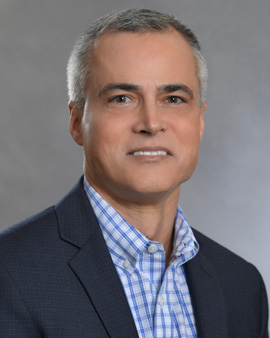
Michael Bouchard, PhD
For decades, the hepatitis B virus has been considered the leading cause of liver cancer. In coming years, however, the growing obesity epidemic will overtake hepatitis B and contribute to millions of cases of liver cancer worldwide. Virologist Michael Bouchard, PhD, is studying the changing face of this deadly disease in groundbreaking detail.
The World Health Organization estimates that one-third of the world's population has been infected with hepatitis B, and approximately 240 million people remain chronically infected. About 25 percent of those individuals will eventually develop liver cancer. The number of new hepatitis B infections has declined since the advent of the hepatitis B vaccine, which is universally required in many countries.
Seeing both a scientific challenge and a human need, Bouchard began researching liver cancer as a postdoctoral fellow. "I was drawn to study liver cancer and hepatitis B because even though the connection between the two has been recognized for around 50 years, the effects of the virus can be very subtle and the exact relationship with liver cancer has been difficult to define."
Yet even as global rates of hepatitis B have declined, the rates of liver cancer have grown, and Bouchard, an associate professor of biochemistry and molecular biology at the College of Medicine, has shifted his research to focus on the rising problem of obesity. "Research has shown that someone who is obese develops metabolic syndrome and, in particular, insulin resistance, which can lead to type 2 diabetes and nonalcoholic fatty liver disease. It's the nonalcoholic fatty liver disease which leads to problems."
Untreated, nonalcoholic fatty liver disease can become nonalcoholic steatohepatitis, or NASH, which is a condition of inflammation and damage in the liver that in turn leads to fibrosis and cirrhosis — both of which are considered common risk factors for liver cancer. Currently, 66 to 70 percent of the population in the United States can be categorized as overweight or obese. "We're seeing the same types of numbers emerging on a global scale now," Bouchard says. "While the percentage of people who go on to the nonalcoholic fatty liver stage and then on to the NASH and cancer stages seems low, it's actually a very large number of people."
Bouchard's current work in partnership with Drexel engineering professor Gail Rosen, PhD, is centered on defining the process of how obesity can lead to liver cancer. In the laboratory, mice are fed either a standard low-fat diet or a Western diet that is high in carbohydrates and fats. The mice are observed over time — not just their livers, but all of their organs, and especially their guts.
Recent interest in the biome, Bouchard says, presents new opportunities for understanding liver biology. "We are very interested in the crosstalk between the liver and the gut, given that the majority of blood dumped into the liver comes from the hepatic portal vein, so the liver is exposed to many metabolites and bacterial products. We can assume it is directly influenced by the biome," he says.
The research, funded by a joint grant from the College of Medicine and the College of Engineering, was designed as a long-term study, to be conducted over a year, so that Bouchard and Rosen can find out how the liver and gut influence one another in the development of pathology, how factors like age and sex can influence disease progression, and how the progression to liver cancer can be stalled.
"We'll be taking samples at multiple time points," Bouchard says. "We will change diets midway for some mice to see if that reverses liver damage." Fat accumulation, for example, has already been noted in mice taking the Western diet for three weeks, but it is not clear if there's a point of no return in terms of the extent of damage or age of the mice.
That broader scope and longer duration distinguishes this research from previous studies that have only looked at disease at onset or afterward, not the holistic picture of how it occurs. Bouchard and Rosen's objective is to figure out ways that physicians can reverse the liver damage associated with obesity. "We want to know if there are lifestyle changes we can recommend, like eating better or getting more exercise in order to prevent the onset of liver cancer in obese individuals," he says.
Bouchard believes he's doing this work at the right time and the right place. "We're lucky here at Drexel to have a concentration of individuals working in the area of liver disease, from basic scientists and physicians to engineers and bioinformatics specialists," he says. "It's really the perfect storm — bringing a vast amount of expertise to bear on an increasingly critical problem."